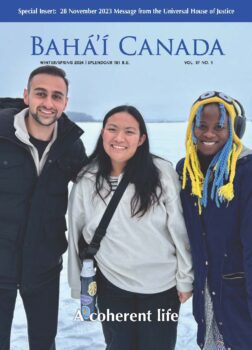Winter/Spring 2024 issue of Bahá’í Canada
 The title of this issue, “A coherent life,” reflects the efforts of Bahá’ís to bring Bahá’u’lláh’s Revelation into reality, both individually and collectively. It seems that the expansive vision required to unleash the society-building power of the Faith calls for higher and higher levels of coherence—a far-reaching concept related to cultivating habits of the mind that seek unity and not division.
The title of this issue, “A coherent life,” reflects the efforts of Bahá’ís to bring Bahá’u’lláh’s Revelation into reality, both individually and collectively. It seems that the expansive vision required to unleash the society-building power of the Faith calls for higher and higher levels of coherence—a far-reaching concept related to cultivating habits of the mind that seek unity and not division.
Of course, thoughts must be translated into action for change to occur. In our lives, this often means adjusting our pace on or breaking away from well-trodden paths carved out by the forces of society. As one of the young adults interviewed for this issue expressed, “[W]hat makes me a Bahá’í if I’m just doing the same thing as everyone else?”
This issue has a strong focus on the experience of Bahá’í youth in Canada. In 2013, the series of worldwide youth conferences called for by the Universal House of Justice galvanized youth and brought to their attention key concepts such as the twofold moral purpose.[i] To this conference, it wrote, “You know well that the habits of mind and spirit that you are nurturing in yourselves and others will endure, influencing decisions of consequence that relate to marriage, family, study, work, even where to live.”[ii]
The feature article, titled “Coherence in the lives of young people entering work: part two” is the second in a series that explores the efforts of young people to live coherent lives of service to humanity. It shares the experience of three graduates of the seminars offered by the Institute for Studies in Global Prosperity, who extend insights from their time at university to their recent experience entering the workforce.
In the section called “From the History,” the article “‘Fiery love in her heart’: Early Bahá’í women teach the Faith in Iran” recounts the heroic efforts of women who, despite being expected to live in the shadows, emerged to proclaim the Faith. Their actions aligned with the transformation that had occurred inside them. Today, our service can also be seen as a deep expression of faith and love.
As complexity increases in the life of an individual—for example, they start work, get married or have children— striving for coherence takes on new elements, both material and spiritual. A workshop recently offered by the Board of Trustees of Huqúqu’lláh in Canada is described in the article “‘Work, Wealth, and Service’ workshops help young people examine coherence in their material and spiritual lives.” In three workshops, youth and their parents in the clusters of North Vancouver, Ottawa and P.E.I. consulted about practical ways to navigate this crucial stage.
The article “Strengthening the junior youth program in Winnipeg” details the way the Fort Garry South neighbourhood, in Winnipeg, Man., through focusing on a single line of action—strengthening the youth movement—built capacity for efforts around children’s classes to also gain in strength. The article provides a valuable example of how learning is disseminated across the country, as visits to Vancouver, B.C., were key to the progress of this neighbourhood.
Coherence is not something that can be developed in isolation. It requires consultation, action, and reflection among a group of friends as they study the Bahá’í Writings, read reality, and act together. In the article “Colibri internships help young people undertake ‘noble goals’,” structured internships that bring together study of the institute with the personal aspirations of young people have helped them to pursue goals that align with their higher natures.
Also in this issue is a gift from the National Spiritual Assembly: a removable insert containing the 28 November 2023 message of the Universal House of Justice, which offers reflections on the first century of the Formative Age. This resource can be used as we continue to study, consult and reflect on this message, as “The National Assembly hopes that it will be studied by all the friends, individually and in groups with friends, families and in communities.”[iii]
[i] The “A Few Thoughts for the Tutor” section of Ruhi Book 1 explains this as “to attend to one’s own spiritual and intellectual growth and to contribute to the transformation of society.”
[ii] From the Universal House of Justice to the participants in the forthcoming 114 youth conferences throughout the world, 1 July 2013.
[iii] From the National Spiritual Assembly of the Bahá’ís of Canada to all Local Spiritual Assemblies, Regional Bahá’í Councils, and Registered Groups, 28 November 2023.
Category: Features, Magazine, Uncategorized








